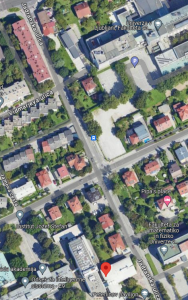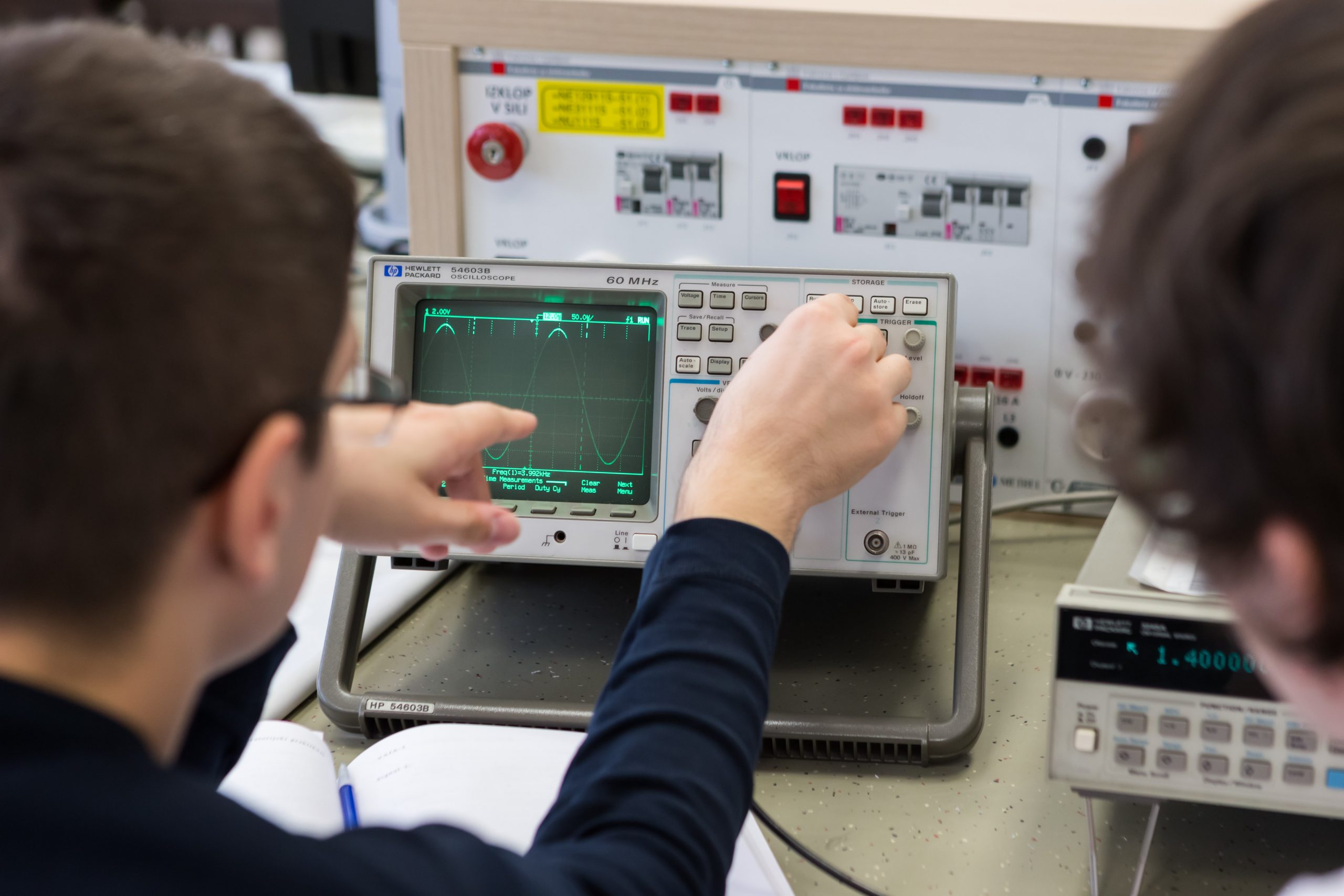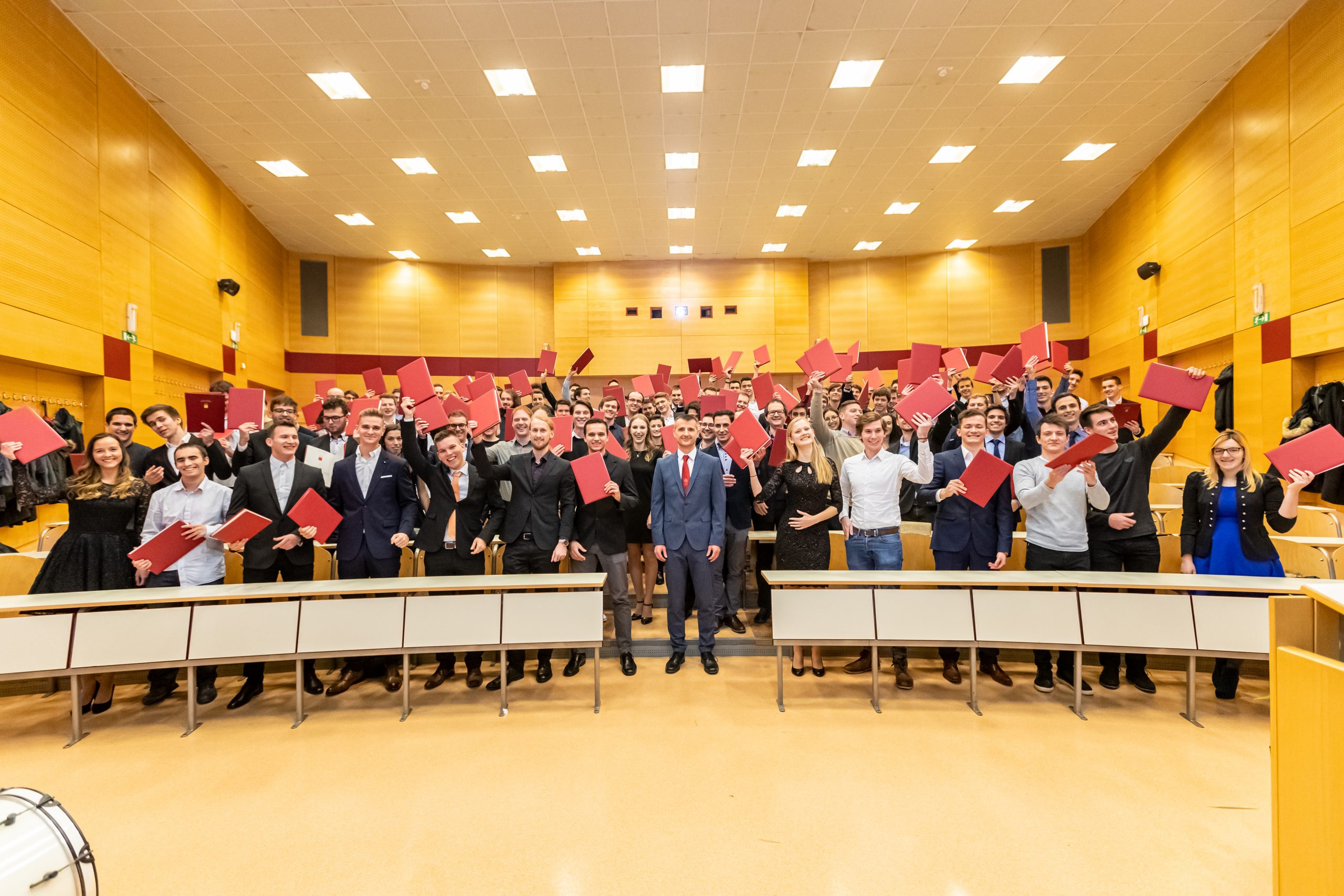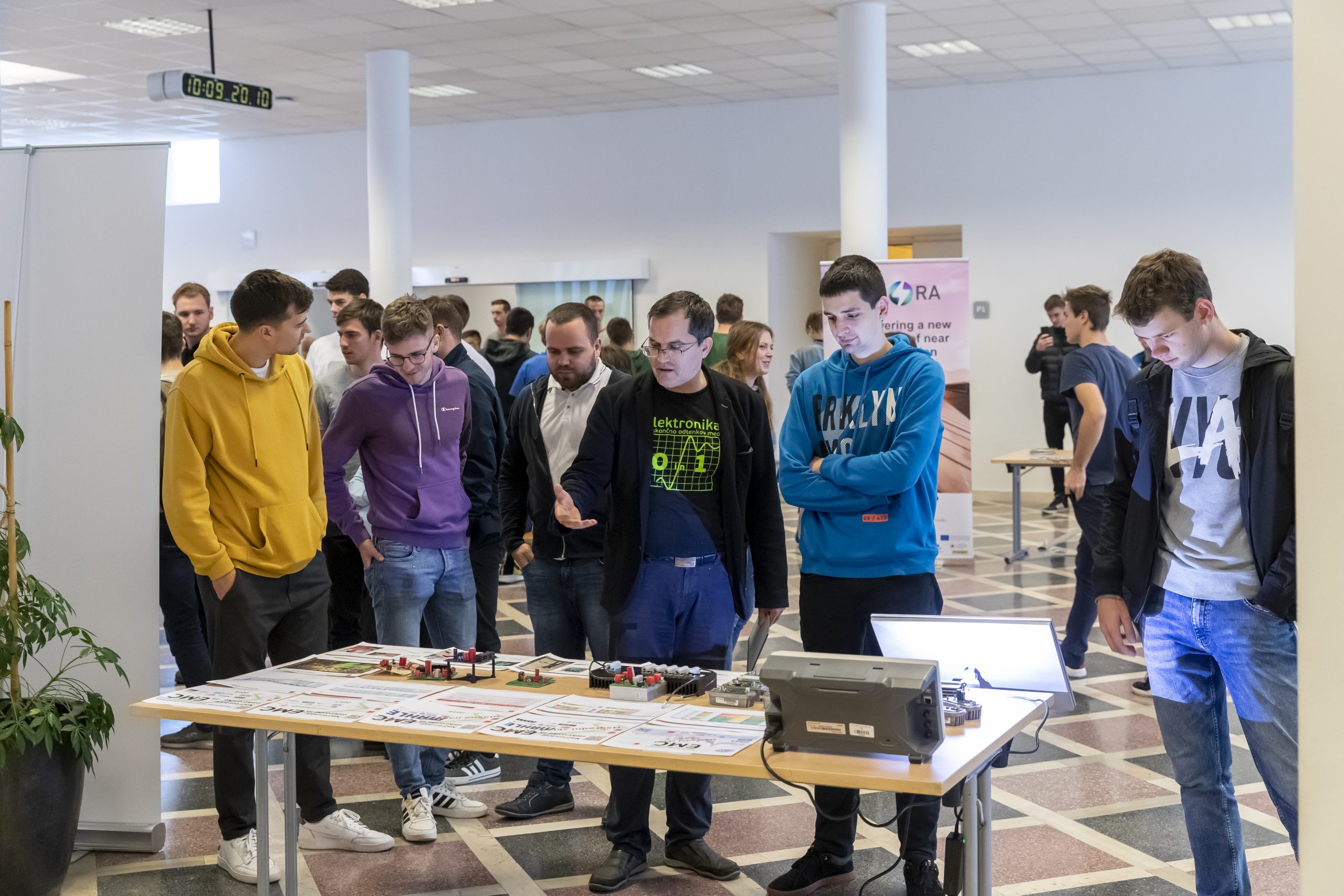Frequently Asked Questions
First time students
Lectures start on the second day after the start of the academic year. The first day is dedicated to the “Reception of the graduates”.
As a rule, lectures come first. The first lecture in each subject is then where you learn all about the exercises, so it is very important to be present – the exercises are compulsory for the exam.
For the bachelors, the rehearsals usually start in the 3rd week of October.
Attendance at the rehearsals is conditional upon completion of the Occupational Safety course.
Laboratory exercises and working with electricity can be dangerous. Therefore, you must have completed the course and declare that you are aware of this danger in order to carry out the laboratory exercises. You will not be able to attend the exercises without having passed the course.
The physics course for the first semester is now called Mechanics and Thermodynamics or Mechanics and Heat.
Lectures are held at 26 Jadranska Street in the Peterlin Pavilion.

You can find the schedule of courses held at FE here.
The schedule of courses held at the FRI is here.
For notifications on the implementation of individual courses:
- courses held at the FRI: https://ucilnica.fri.uni-lj.si
- courses held at the FE: https://e.fe.uni-lj.si
Exam registration and grades for all courses can be found in the FE Studis.
Parallel studies
A student studying a first cycle or a single master’s programme may enrol in another study programme in parallel after successfully completing the first cycle, provided that he or she fulfils the conditions for enrolment in the parallel study programme. Enrolment in a parallel programme (first cycle or single master’s programme) is not possible after the completion of the final year or during the additional (graduate) year.
A second-level student may enrol in a parallel programme without restrictions.
Studies in parallel means simultaneous study in at least two study programmes at the University of Ljubljana. If you are studying at another university, you are not studying in parallel, but on two separate studies.
Enrolment in a parallel programme (1st cycle or single MSc programme) is not possible after the final year of studies or during the additional (graduate) year.
A second-level student may enrol in a parallel programme without restrictions.
Yes.
Yes. A second-level student can enrol in a parallel course without restrictions. For parallel enrolment at level 1, you will need evidence of the entry requirements.
Yes.
A first- or second-level student may enrol full-time in a parallel course without paying tuition fees if he or she has not yet attained the same level of education.
The tuition fee is payable in accordance with the provisions of the Regulations on Contributions and Evaluation of Costs at the University of Ljubljana.
Students on full-time parallel study in first- and second-level study programmes are not charged tuition fees if the student is already enrolled in a study programme leading to a level of education corresponding at least to the level of education obtained in the study programme of the parallel study (Article 77(5) of the Law on Higher Education).
Student status is maintained as long as the student is enrolled in (at least) one year or additional year of the study programme. As parallel studies are two completely separate study programmes, a student on both programmes has all the rights attached to student status. Even if a student discontinues his/her studies on one programme and progresses regularly on the other, he/she still has the status of a student on that programme.
The same applies if he/she completes the home course and is still completing the parallel course. A student may also decide to drop one study and complete only the other (regardless of which was the “home” study in the first place).
Student status
Student status is valid until the end of the academic year (30 September), but students can also withdraw from their student status after completing their first or second cycle studies.
In the third cycle, the student’s status is terminated at the end of studies or one year after the end of the last semester of the study programme (Article 93(3) of the UL Statutes).
According to the ZViS, students can either repeat a year/enrol for an additional year or change their study programme or course of study once during their studies. If you make use of any of these options, you will not be entitled to an extra year.
Student status does not end with employment. Certain rights attached to student status (health insurance, working through student referrals, subsidised meals, transport, residence in a student residence, etc.) end when you get a job.
It is a promotion to a higher year without any interruptions in between, including repeating a year. It also includes accelerated promotion and extension of status for justified reasons.
Yes, (within 2 years).
The UL Statutes allow students to continue their studies for two years after interruption of their studies without a specific request, and therefore these students are considered to be on an equal footing with students who have not interrupted their studies in terms of the rights to fulfil their studies at UL.
A person who has paid tuition fees and has lost the status of a student shall be subject to the provisions of Article 21 of the Regulations on Contributions and Evaluation of Costs at the University of Ljubljana for the academic year 2023/2024 (hereinafter referred to as the Regulations). All first and second cycle students, regardless of whether they pay tuition fees or not, are required to pay for the 4th and 5th examinations. During the period in which they are allowed to take the requirements (2 years), they may therefore find themselves in exactly the same situation as students who have not interrupted their studies with regard to their studies:
- they pass all the requirements for advancement to a higher year,
- pass the conditions for exceptional admission to a higher year,
- pass the conditions for repeating a year, if the programme has them.
Therefore, a student may benefit from the same study rights as a non-interrupted student during the period of fulfilment of the obligations, including the right to repeat a year of study if he/she has not already repeated it or to change programmes of study.
The tuition fee for the year shall pay for the student to complete all the study requirements of the year in which the student is enrolled and for which the tuition fee has been paid, and for a maximum of three opportunities to sit each examination, or for a maximum of two opportunities to sit examinations in the doctoral programme. A person who has paid the tuition fees and has lost his/her status as a student shall be subject to the provisions of Article 21 of the Regulations.
Enrolment in the upper year of another study programme means that the student has exercised the right to change study programme or course.
The latter is also implied by the provision of Article 70, paragraph 2, of the ZVIS: “Notwithstanding the fourth indent of the preceding paragraph (-if the student does not complete his/her studies in the first- or second-level study programme within 12 months after the end of the last semester), the student’s status shall cease at the end of the last semester if he/she has repeated a year of study or has changed his/her programme of study or course of study during the period of study.
Translated with www.DeepL.com/Translator (free version)
The student’s status may be extended for justified reasons (Article 70(3) ZViS) if:
- he/she fails to complete his/her studies in a first- or second-level study programme within 12 months of the end of the last semester,
- the student does not complete the second cycle of a single master’s degree programme within 12 months of the end of the last semester,
- does not enrol in the following year or semester during the period of studies.
Justifiable reasons (Article 126, paragraph 2, of the UL Statutes) include, for example: prolonged illness, exceptional family and social circumstances, parenthood and the status of a student with special needs or special status. For foreign students in their first year of study who do not have Slovene as their first language, learning Slovene may be considered as a valid reason.
Student status may also be extended for justified reasons during the final year of studies and during the additional year, which applies to all three levels of study and also to the single master’s degree programmes.
Student status may be extended for justified reasons only if the student has not interrupted his/her studies during the previous year (or the year in which the application for extension is submitted).
Translated with www.DeepL.com/Translator (free version)
The status can be renewed only once and for a maximum of one academic year.
Student mothers who give birth during their studies and students who become fathers during their studies have the right to extend their student status for one year for each child born.
Student status is valid until the end of the academic year (30 September), but students can also withdraw from their student status after completing their first or second cycle studies.
In the third cycle, the student’s status is terminated at the end of studies or one year after the end of the last semester of the study programme (Article 93(3) of the UL Statutes).
The status of a student with special needs or a student with a special status is also considered a valid reason under Article 70 of the ZViS. The status may be renewed for justified reasons only once and for a maximum of one academic year.
Student mothers who give birth during their studies and students who become fathers during their studies have the right to extend their student status for one year for each child born. To be eligible for an extension for parenthood, a student must become a parent while he/she has “active” student status (he/she must not have interrupted his/her studies at the time of the child’s birth).
Rule: claiming maternity/paternity only immediately after the academic year of the child’s birth.
Exception: only in the 2nd academic year after the birth of the child, taking into account the time of the birth and the obligations already fulfilled for the entry to the higher year of study, example: in the academic year 2016/2017, in August or September exactly, the student gives birth. Since she has fulfilled all the requirements for entry to the upper year, she enrols in the second year of the first cycle in the academic year 2017/2018. She will be granted an extension of her status in the 2018/2019 academic year.
The paternity/maternity status may also be extended during the final year of studies and during the additional year, which applies to all three levels of study and also to the single Master’s degree programmes.
Twins: The student can have his/her status extended for 2 years. The student may or may not make use of this right. This means that the student will be able to complete all the obligations in the first extension year and will not be able to take advantage of the second extension or will not want to take advantage of the second extension.
Both the student (mother) and the student (father), i.e. both parents, can benefit from the right at the same time, independently of each other.
Translated with www.DeepL.com/Translator (free version)
Tuition fees
This is laid down in the Rules on Contributions and Valuation of Expenses at the University of Ljubljana, which are adopted annually by the University of Ljubljana’s Management Board.
The provisions on the refund of tuition fees paid are laid down in the Regulations on Contributions and Evaluation of Expenses at the UL. As a general rule[*], a student is obliged to pay a part of the tuition fees when he/she withdraws before the end of the academic year, namely: 10℅ of the contractual tuition fee if he/she withdraws irrevocably by 31 October of the current year or within 15 days after the conclusion of the contract, or 55℅ of the contractual tuition fee for the year in which he/she is enrolled if he/she withdraws irrevocably by the end of the first semester.
In accordance with Article 40 of the ZViS, a student who, after first enrolment in the first year of a study programme, withdraws by 15 October of the academic year in which he/she enrolled shall be deemed not to have enrolled in that study programme.
Enrolment, repetition, gap year
You may miss one exam in the current year of study in order to be admitted to a higher year. It does not matter how many credits the course has.
You must have passed all the exams from previous years.
To re-enter the first year, students must have at least 30 credits.
To repeat the 2nd or 3rd year, you must have all (60) credits from the previous years and 30 credits from the current year.
There are no prerequisites to enrol in an additional year.
Students who have never repeated or changed their programme of study or course of study during their studies may enrol for an additional year.
No. Electives can no longer be changed once enrolment has been confirmed.
We suggest that before selecting your electives:
- attend the elective presentations that take place in P1 each spring,
- read the course descriptions on the course descriptions page.
No. You can no longer change your course once your enrolment has been confirmed.
We suggest you attend an Informative Day, where the courses are presented in more detail. The Informative Day takes place every spring.
If you don’t meet the eligibility criteria, you will lose your student status and all the benefits that go with it.
You are allowed to continue your studies if you enrol as a student. You will be allowed to take exams, but you will have to pay for each exam you take according to the current Price List.
You should take special care to take out compulsory health insurance before 30 September, as you will no longer be insured through your parents.
Once you have the conditions to enrol in a higher year, you will regain your status.
Translated with www.DeepL.com/Translator (free version)
Change of study programme
Students who have not yet repeated or who have already transferred can be enrolled in different study programme.
To make a transcription, follow these steps:
- Submit your application to the Board of Studies at least 2 months before the transcript. Students from other faculties must also submit a transcript of the requirements completed at their home faculty.
- Between 1 and 9 September, you submit your application on the EVŠ portal.
- Wait for the invitation to enrol, which you will receive in your email address.
If you are transferring in Year 1, you must submit your application on the EVŠ portal, together with all the other applicants enrolled in Year 1.
If you are transferring in the upper years, please follow the procedure above.
Transfer is only possible in the 1st year between the VS and the UN programme.
There are no restrictions for transfer from the UN to the VS programme.
To transfer from the VS to the UN programme you need a minimum average of 8.3.
If you are transferring from 1st to 2nd year (advancing), you do not lose an extra year. If you are transferring from 1st to 1st year, you lose an extra year.
Leaving your studies
If the student withdraws from the study programme by 15 October, he/she is deemed not to have exercised his/her right to enrol.
Students can only enrol in a new first- or second-level study programme after they have withdrawn from their previous programme. According to Article 70(5) of the ZViS, a student retains his/her status if he/she withdraws from a study programme in order to enrol in a new study programme. For more detailed information, please contact the Office of the Member State you wish to enrol in before withdrawing.
According to Article 70 of the ZViS, the student’s status ceases if the student withdraws from the study programme. This means that from the date of withdrawal, the student loses his/her student status and the rights attached to it (e.g. health insurance, subsidised meals, work through a student service, etc.). The student also loses his/her status from the date of expulsion.
However, a student who transfers to another study programme before the end of the academic year does not lose his/her status (Article 70(5) of the ZViS). In this case, the student must only withdraw when he/she receives a decision on the result of the selection procedure that he/she has been accepted to the new study programme.
Yes, but you must pay the tuition fee (Article 77(6) of the ZViS). For information on enrolment after withdrawal, students can contact the Member State from which they have withdrawn.





